Black tea is more than just a morning pick-me-up — it’s a proven, science-backed beverage that can boost heart health, sharpen focus, and even support longevity.
Rich in antioxidants like theaflavins and thearubigins, black tea helps protect your cells from oxidative stress, regulate blood sugar, and improve digestion — all while delivering a calm, sustained energy boost.
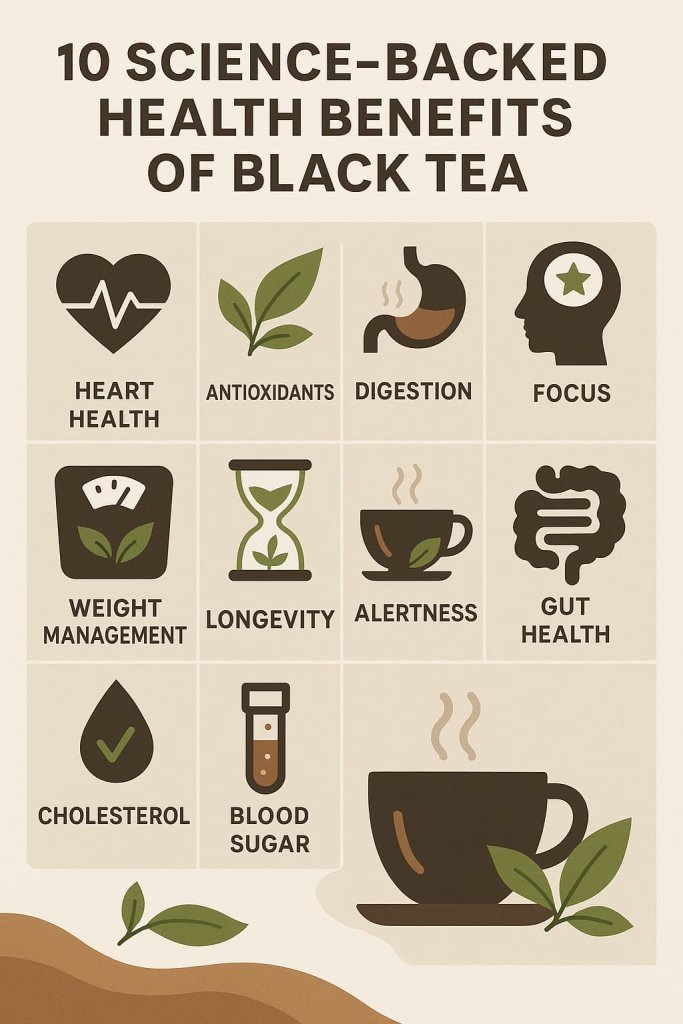
Understanding the health benefits of black tea is important because it’s one of the simplest, most affordable ways to enhance daily wellness. Whether you prefer it hot or iced, with milk or lemon, this centuries-old drink supports your heart, brain, metabolism, and immune system naturally.
In this guide, you’ll discover the 10 amazing, science-backed benefits of black tea, learn the best ways to prepare it, safe daily intake recommendations, and how to enjoy its full potential according to recent research.
What Is Black Tea?
Black tea is a fully oxidized tea made from the Camellia sinensis plant — the same source as green, white, and oolong tea — but with a richer flavor and darker hue.
What makes black tea unique is its oxidation process, in which freshly picked tea leaves are exposed to air until they turn deep brown. This natural enzymatic reaction enhances flavor and creates powerful antioxidant compounds that distinguish black tea from its lighter counterparts.
During oxidation, green tea’s catechins transform into theaflavins and thearubigins, the potent polyphenols responsible for black tea’s deep amber color and complex aroma. These compounds also contribute to its health-promoting effects, such as improving cholesterol balance, reducing inflammation, and supporting vascular health.
Black tea varieties differ by origin, soil, and processing style. The most popular types include:
- Assam (India): Strong, malty flavor — often used in breakfast blends.
- Darjeeling (India): Floral and muscatel aroma, sometimes called the “Champagne of teas.”
- Ceylon (Sri Lanka): Bright and citrusy with medium strength.
- Earl Grey: A blend of black tea infused with bergamot oil for a fragrant twist.
According to the Tea Association of the USA, black tea accounts for over 75% of global tea consumption, making it the most widely enjoyed type worldwide.
Besides its rich cultural history, black tea’s chemical composition — including caffeine, amino acids like L-theanine, and minerals such as potassium and manganese — gives it both stimulating and health-enhancing properties.
In short, black tea is not only a beloved beverage but also a functional drink that supports modern wellness through centuries-old tradition.
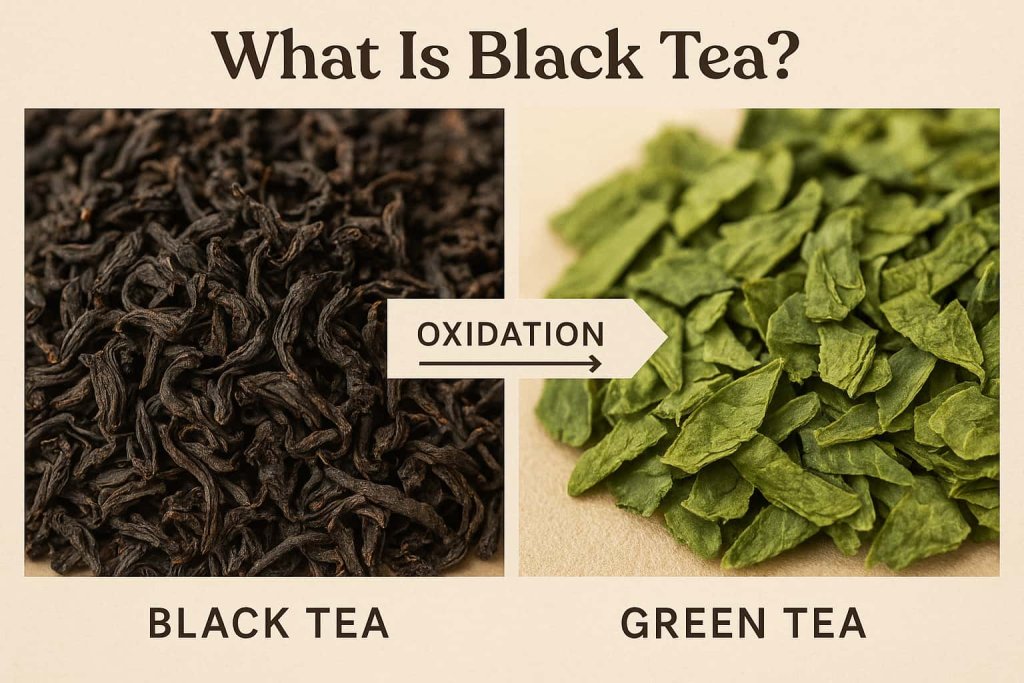
Nutritional Profile of Black Tea
Black tea isn’t just flavorful — it’s surprisingly low in calories and rich in beneficial compounds that support your overall well-being. Unlike sugary drinks or energy beverages, a plain cup of black tea provides zero fat, minimal calories, and a steady energy boost thanks to its natural caffeine and micronutrient content.
According to the USDA FoodData Central, an 8-ounce (240 ml) cup of brewed black tea contains essential minerals like manganese, fluoride, and potassium, which play a key role in bone strength, dental health, and metabolic function.
Basic Nutrition Facts (Per 1 Cup / 240 ml of Brewed Black Tea)
| Nutrient | Amount | % Daily Value (Approx.) | Notes |
|---|---|---|---|
| Calories | 2 kcal | 0% | Practically calorie-free — ideal for weight management. |
| Total Fat | 0 g | 0% | No fat or cholesterol. |
| Carbohydrates | 0.4 g | <1% | Trace natural plant carbs. |
| Protein | 0.1 g | 0% | Minimal but present in amino acid form. |
| Caffeine | 40–70 mg | — | Moderate stimulant; varies by steep time. |
| Manganese (Mn) | 0.5 mg | ~25% | Supports metabolism and antioxidant enzymes. |
| Fluoride (F) | 0.2–0.5 mg | — | Strengthens tooth enamel; supports oral health. |
| Potassium (K) | 88 mg | ~2% | Helps maintain fluid balance and muscle function. |
| Polyphenols | 200–300 mg | — | Key antioxidants (theaflavins, catechins, thearubigins). |
(Source: USDA FoodData Central, 2025 and Harvard T.H. Chan School of Public Health)
Black Tea vs. Green Tea: Quick Nutrition Comparison
| Feature | Black Tea | Green Tea |
|---|---|---|
| Caffeine (per cup) | 40–70 mg | 25–45 mg |
| Antioxidants | Theaflavins, Thearubigins | Catechins (EGCG) |
| Flavor Profile | Bold, malty, slightly bitter | Light, grassy, mildly sweet |
| Color & Processing | Fully oxidized leaves | Minimally oxidized leaves |
| Polyphenol Focus | Heart & vascular support | Fat metabolism & anti-aging |
| Fluoride Content | Moderate to high | Moderate |
| Best Time to Drink | Morning or early afternoon | Anytime (lower caffeine) |
Black tea tends to have more caffeine and stronger antioxidant compounds that support cardiovascular health, while green tea is known for its fat-burning catechins and milder energy lift. Both are excellent, but black tea often provides a richer, more sustained energy effect for daily focus and productivity.
Key Takeaway
Black tea is one of the healthiest zero-calorie beverages you can drink.
It’s naturally energizing, rich in antioxidants and trace minerals, and far more beneficial than sugary sodas or processed energy drinks. Whether you prefer it hot, iced, or with a splash of milk, every cup supports hydration, metabolism, and long-term wellness.
(References: USDA FoodData Central, Harvard Nutrition Source, Mayo Clinic)
Why Black Tea Matters for Your Health
Black tea is far more than a caffeine boost — it’s one of the world’s most researched natural sources of polyphenols, offering measurable benefits for your heart, brain, metabolism, and longevity.
Its active plant compounds — particularly flavonoids — are scientifically proven to protect cells from oxidative damage, improve blood vessel function, and support a healthy immune and digestive system. The Harvard T.H. Chan School of Public Health notes that tea polyphenols help reduce inflammation and promote healthy cholesterol levels, which are crucial for long-term cardiovascular health.
Unlike coffee, black tea’s moderate caffeine (about 40–70 mg per cup) and L-theanine content provide a smooth, sustained mental boost without causing jitters or energy crashes. This makes it a balanced choice for focus, productivity, and relaxation.
Regular black tea drinkers — typically those who enjoy two to three cups per day — have shown in multiple studies to have better heart health, improved metabolism, and lower all-cause mortality compared to non-tea drinkers. A major cohort study by the National Cancer Institute (NCI, 2022) found that individuals who drank at least two cups daily had a 9–13% lower risk of death from any cause, particularly from heart and stroke-related conditions.
Additionally, findings from UCLA Health highlight that black tea supports healthy blood sugar regulation and gut microbiota balance, offering protective benefits against chronic diseases like diabetes and obesity.
In essence: black tea is a simple, accessible way to nurture long-term health. Its unique blend of caffeine, antioxidants, and amino acids makes it a modern super drink — one that energizes your body, sharpens your mind, and protects your cells from within.
Now that you understand why black tea deserves a spot in your daily routine, let’s explore the 10 powerful, science-backed health benefits that make it one of nature’s most beneficial beverages.
10 Science-Backed Health Benefits of Black Tea
Black tea isn’t just a refreshing beverage — it’s a natural source of powerful antioxidants, minerals, and bioactive compounds that can transform your overall health. Below are 10 evidence-based benefits of black tea, explained clearly and backed by reputable studies from organizations like the National Institutes of Health (NIH), Harvard Health, and UCLA Health.
1. Rich in Antioxidants That Protect Your Cells

Black tea is packed with natural antioxidants — especially theaflavins, catechins, and thearubigins — that help your body fight oxidative stress, a leading cause of cell damage, premature aging, and chronic disease.
According to Healthline (2024), these antioxidants neutralize free radicals and help lower inflammation throughout the body. Regular consumption has been shown to support cellular longevity, improve skin resilience, and enhance your body’s natural detoxification processes.
Research published in the Journal of Food Composition and Analysis also confirms that black tea’s antioxidant capacity rivals that of green tea, making it one of the best natural beverages for daily defense against oxidative stress.
2. Supports Heart Health and Circulation

One of the most well-documented benefits of black tea is its positive impact on heart and vascular health. Studies suggest that drinking two to four cups daily can help lower LDL (“bad”) cholesterol, improve blood vessel dilation, and enhance arterial elasticity — all key factors in preventing heart disease.
A 2023 NIH-backed meta-analysis found that regular black tea intake was linked to a significant reduction in coronary artery disease and stroke risk. The tea’s flavonoids also help regulate blood pressure and reduce inflammation, which protects your arteries over time.
If you’re looking for a heart-healthy daily habit, switching from sugary drinks to black tea is one of the simplest, most cost-effective lifestyle changes you can make.
3. Helps Regulate Blood Sugar Levels
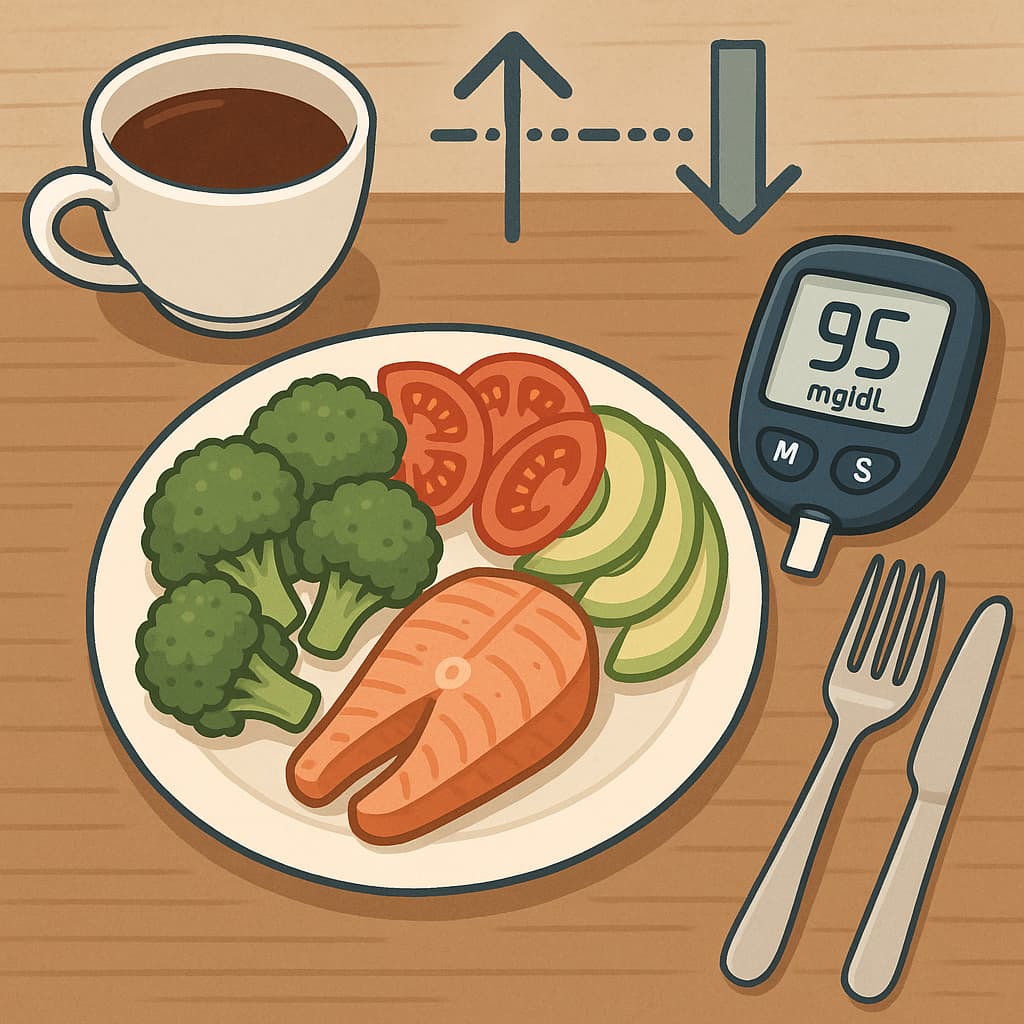
For those concerned about blood sugar control or insulin resistance, black tea may offer a natural advantage. Its polyphenolic compounds appear to improve insulin sensitivity and slow carbohydrate absorption, helping to stabilize blood sugar after meals.
A clinical trial published in Nutrients (2023) and summarized by UCLA Health found that participants who drank black tea before meals experienced significantly lower post-meal glucose spikes compared to non-tea drinkers.
This makes black tea a smart beverage choice for individuals managing prediabetes or those looking to balance energy levels throughout the day — without added calories or sugar.
4. Promotes Weight Management

If you’re trying to maintain or lose weight, black tea can complement your goals. Its natural polyphenols enhance fat metabolism, promote thermogenesis (the body’s calorie-burning process), and may even reduce fat absorption in the digestive tract.
Emerging research from the NIH’s PubMed Central suggests that black tea polyphenols positively influence gut microbiota composition, encouraging the growth of beneficial bacteria that support healthy weight management.
While black tea isn’t a magic fat burner, including it in a balanced diet and active lifestyle can enhance your overall metabolic health and fat-burning efficiency.
5. Improves Focus and Brain Function
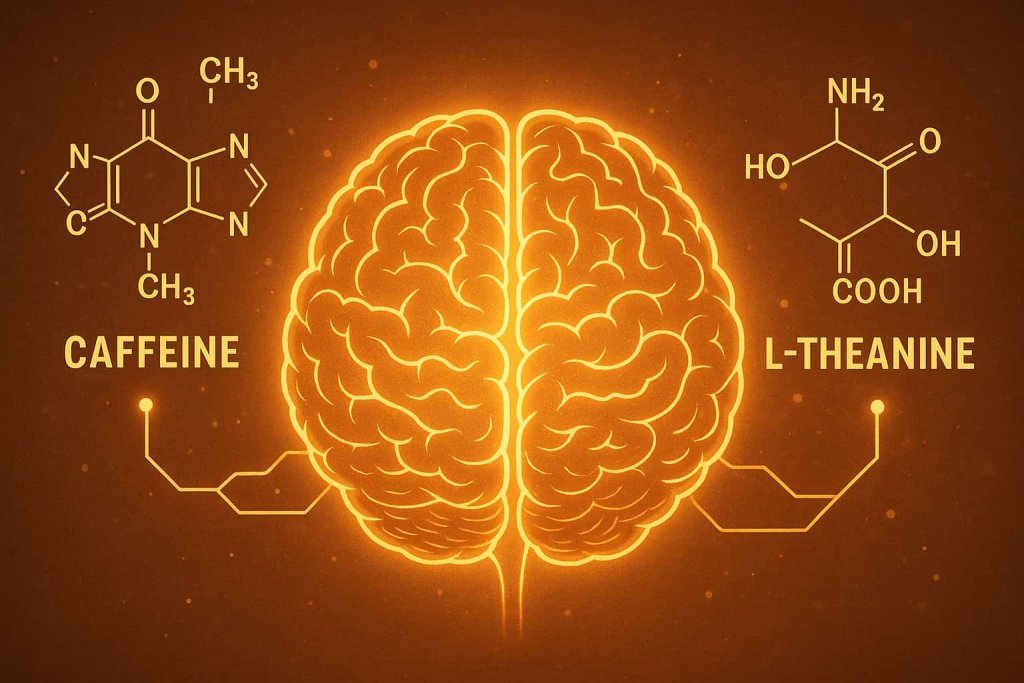
Need a mental boost without the crash? Black tea’s unique combination of caffeine and L-theanine provides a balanced energy lift while enhancing concentration and focus.
According to UCLA Health (2024), this pairing improves attention span, reaction time, and working memory, making black tea ideal for studying, work, or creative tasks.
Unlike coffee, black tea’s moderate caffeine levels promote steady alertness without triggering anxiety or jitteriness. Many people report that switching from coffee to black tea enhances productivity and mental clarity throughout the day.
6. May Lower Risk of Stroke and Mortality

Large-scale studies continue to highlight black tea’s potential for increasing longevity. The landmark UK Biobank Study (2022), which included more than 500,000 adults, found that those who drank two or more cups of black tea per day had a 9–13% lower risk of death from any cause, especially from cardiovascular disease and stroke.
Researchers suggest that black tea’s rich flavonoids improve heart function, reduce oxidative stress, and support endothelial (blood vessel) health — all contributing to longer life expectancy.
This finding aligns with guidance from the Harvard T.H. Chan School of Public Health, which recommends moderate tea consumption as part of a heart-protective diet.
7. Boosts Gut Health
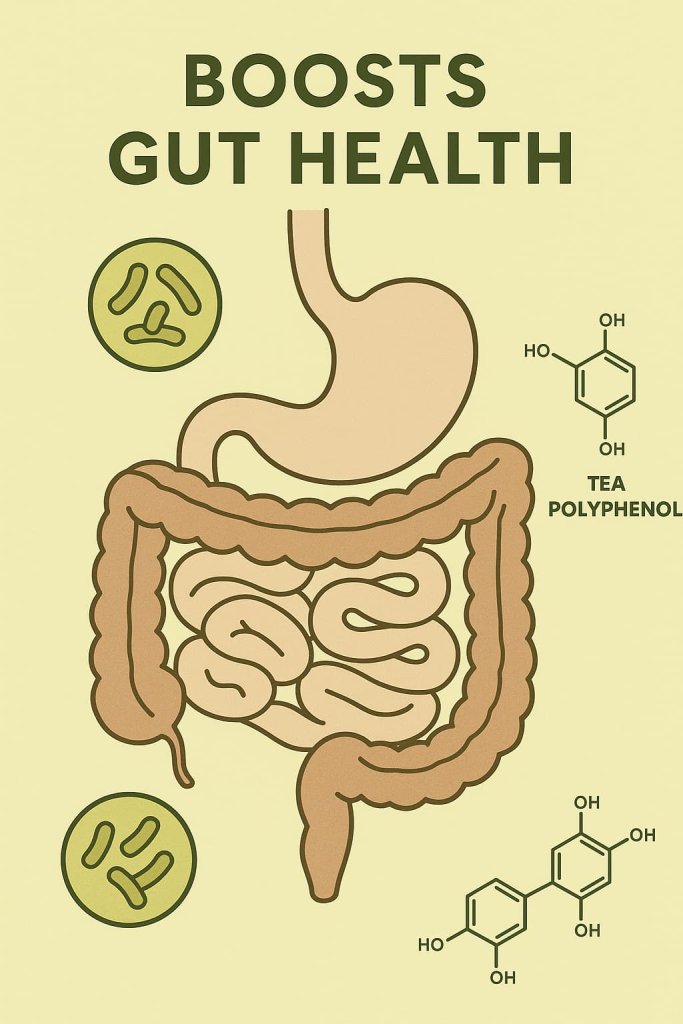
Your gut microbiome plays a central role in digestion, immunity, and even mood regulation — and black tea can help keep it balanced.
A 2024 review in the NIH’s National Library of Medicine revealed that black tea polyphenols promote the growth of beneficial bacteria such as Bifidobacterium and Lactobacillus, while suppressing harmful microbes.
This microbial shift supports better digestion, improved nutrient absorption, and reduced gut inflammation. It may also contribute to stronger immune defense and healthier metabolism, showing that your daily tea habit benefits more than just your taste buds.
8. Strengthens Oral and Dental Health

Surprisingly, black tea is also good for your teeth and gums. Its natural polyphenols have mild antibacterial properties that can reduce the growth of Streptococcus mutans and Lactobacillus — two bacteria responsible for plaque formation and cavities.
According to Verywell Health (2024), drinking unsweetened black tea may lower the risk of tooth decay and bad breath, and its fluoride content helps strengthen enamel.
For best results, avoid adding sugar, and rinse your mouth with water afterward to minimize potential staining from tannins.
9. May Support Cancer Prevention

Although research is ongoing, early findings suggest that black tea may help reduce cancer risk through its rich polyphenolic compounds. Laboratory and animal studies show that theaflavins and thearubigins can inhibit tumor cell proliferation, trigger apoptosis (programmed cancer cell death), and suppress angiogenesis (new blood vessel growth in tumors).
A comprehensive review on PubMed Central (NIH, 2024) highlighted these mechanisms as potential pathways for cancer prevention.
However, experts emphasize that these effects have not yet been fully proven in humans. Drinking black tea should be seen as part of a preventive lifestyle, not a substitute for medical treatment.
10. Enhances Longevity and Energy Naturally

The combined benefits of heart protection, antioxidant defense, and stable energy make black tea a longevity-friendly beverage.
According to Harvard Health (2024), habitual tea drinkers tend to have lower overall mortality rates and better cardiovascular resilience. The moderate caffeine content supports sustained energy and alertness throughout the day, without the harsh comedown of energy drinks or coffee.
Simply replacing one sugary beverage or soda with a cup of black tea can have measurable long-term benefits for both energy levels and overall health span.
Best Natural Ways to Enjoy Black Tea

Enjoying black tea the right way can help you maximize its flavor, antioxidant power, and health benefits. Whether you’re sipping it hot in the morning or chilled in the afternoon, a few simple preparation tips can make a big difference.
According to the Tea Association of the USA, brewing temperature, steeping time, and water quality all influence the nutrient content and flavor strength of your cup. Here’s how to make the most of your black tea ritual.
1. Use High-Quality Loose-Leaf Tea (When Possible)
Choosing loose-leaf black tea over bagged tea can significantly enhance both the flavor and the health benefits of your brew. Loose-leaf varieties typically contain whole or larger tea leaves, which preserve more of their natural polyphenols — including theaflavins and thearubigins, the key antioxidants linked to heart and cellular health.
According to the Harvard T.H. Chan School of Public Health, higher-quality teas generally contain more bioactive compounds and antioxidants that support cardiovascular, metabolic, and cognitive function. The way the leaves are processed and brewed affects the final concentration of these beneficial compounds in your cup.
If you prefer tea bags, opt for unbleached or pyramid-shaped bags that allow better water flow and nutrient extraction. Always look for organic or pesticide-free tea brands, as these ensure purity and minimize chemical residue, maintaining both the safety and nutritional integrity of the tea.
In short, choosing quality loose-leaf tea means getting a richer taste and more of the plant’s natural health-promoting compounds — making every sip more rewarding for your body and mind.
2. Brew at the Right Temperature and Time
Brewing black tea the right way helps preserve its antioxidants, enhance flavor, and maintain its nutritional value. Both temperature and steeping time determine how effectively health-promoting compounds like theaflavins and thearubigins are released.
According to the UK Tea & Infusions Association, black tea is best prepared with freshly boiled water (around 90–98°C / 194–208°F) and steeped for 3 to 5 minutes, depending on the tea variety and desired strength. Over-steeping or using water that’s too hot can lead to excessive tannin release, making the tea bitter and reducing antioxidant potency.
Here’s a quick brewing guide for different black tea types:
| Type of Black Tea | Ideal Water Temperature | Steeping Time | Flavor Profile |
|---|---|---|---|
| Assam / English Breakfast | 90–95°C (195–203°F) | 3–5 minutes | Strong, malty, energizing |
| Darjeeling (1st flush) | 85–90°C (185–194°F) | 2–3 minutes | Floral, light-bodied |
| Ceylon / Earl Grey | 90–95°C (195–203°F) | 3–4 minutes | Bright, citrusy notes |
| Masala Chai (with milk/spices) | 100°C (212°F) | 5–7 minutes | Creamy, aromatic, spiced |
Expert Tip: Always use freshly boiled filtered water, not water that’s been reheated several times. Reboiling reduces oxygen levels, dulling both the flavor and antioxidant content. For stronger tea, increase the leaf quantity rather than extending the steeping time — this ensures full flavor without extra bitterness.
Proper brewing isn’t just about taste — it’s also key to preserving the polyphenols that contribute to black tea’s well-documented benefits for heart health, energy, and antioxidant protection.
3. Drink at the Right Time of Day
The timing of your tea can affect both its energy benefits and nutrient absorption:
- Morning: Ideal for a gentle caffeine boost that enhances alertness without overstimulation.
- After Meals: Helps with digestion and supports blood sugar control.
- Early Afternoon: A good pick-me-up for focus and productivity.
- Avoid Late Evening: Black tea contains caffeine, which can disrupt sleep if consumed too close to bedtime.
Many experts, including those at Mayo Clinic, suggest finishing your last caffeinated tea at least 6 hours before bedtime.
4. Add Natural Enhancers — Not Sugar
While sweetened tea is common, adding refined sugar or flavored syrups cancels out many of black tea’s health benefits.
Instead, try these natural, health-friendly alternatives:
- Lemon: Adds vitamin C and enhances antioxidant absorption.
- Honey (in moderation): A natural sweetener with antimicrobial properties.
- Milk: Softens tannins and adds calcium — especially good in English or chai blends.
- Spices: Cinnamon, cardamom, and ginger improve digestion and add warmth.
(Source: Healthline)
5. Stay Hydrated and Moderate Your Intake
Although black tea contributes to your daily hydration, it still contains caffeine — a mild diuretic.
To stay balanced:
- Limit yourself to 2–4 cups per day (about 400–500 mg of caffeine total).
- Drink plenty of water alongside your tea.
- If you’re caffeine-sensitive, choose decaffeinated black tea or reduce steeping time to cut caffeine levels by up to 50%.
Key Takeaway
To get the most out of your black tea:
- Choose high-quality loose-leaf tea.
- Brew gently at 90–95°C for no longer than 5 minutes.
- Skip refined sugar — use lemon, milk, or spices instead.
- Drink 2–3 cups daily for sustained energy, antioxidant protection, and better heart health.
These small adjustments can turn a simple cup into a daily wellness habit backed by science and tradition.
(References: Tea Association of the USA, Mayo Clinic, UCLA Health)
Recommended Daily Intake, Safety & Side Effects
While black tea is one of the world’s healthiest beverages, moderation is essential to ensure you get all the benefits without unwanted side effects. Drinking the right amount — and preparing it properly — helps you stay energized, hydrated, and safe.
According to the Mayo Clinic and the National Institutes of Health (NIH) Office of Dietary Supplements (ODS), most adults can safely enjoy 2 to 4 cups of black tea daily, depending on caffeine tolerance, age, and health status.
Recommended Daily Intake of Black Tea
| Group | Recommended Amount | Caffeine Intake (Approx.) | Notes |
|---|---|---|---|
| Healthy Adults | 2–4 cups per day | 200–400 mg | Safe range for most individuals; provides full health benefits. |
| Pregnant Women | Up to 2 cups per day | ≤200 mg | Limit caffeine; high intake may affect fetal development. |
| Breastfeeding Women | 1–2 cups per day | ≤200 mg | Trace caffeine passes through breast milk — moderation advised. |
| Teens (13–18 years) | 1 cup per day | ≤100 mg | Avoid excess caffeine to prevent sleep or focus issues. |
| People Sensitive to Caffeine | 1 cup per day or decaf | <50 mg | Choose shorter brew time or decaffeinated options. |
(Sources: NIH ODS, Mayo Clinic)
Caffeine Considerations
Each cup of black tea contains roughly 40–70 mg of caffeine, depending on the variety and steeping time.
While caffeine improves alertness, focus, and metabolism, too much can lead to:
- Restlessness or jitteriness
- Increased heart rate or anxiety
- Difficulty sleeping (especially if consumed late in the day)
If you’re sensitive to caffeine or have high blood pressure, try shorter steeping times (2–3 minutes) or opt for decaffeinated black tea to cut caffeine content by up to 50%.
(Reference: Mayo Clinic Caffeine Guidelines)
Safety During Pregnancy and Breastfeeding
Pregnant and breastfeeding individuals should keep total caffeine intake under 200 mg per day — equivalent to about two cups of black tea.
Research reviewed by the American College of Obstetricians and Gynecologists (ACOG) shows that excessive caffeine consumption may increase the risk of low birth weight or preterm delivery.
If you’re pregnant, discuss your tea habits with your healthcare provider, especially if you also consume coffee, chocolate, or soda — all sources of caffeine.
Medication Interactions
Black tea is generally safe, but its caffeine and tannin content can interact with certain medications and minerals:
- Iron absorption: Tannins may reduce non-heme iron absorption when consumed with meals. To prevent this, drink tea between meals, not during.
- Medications affected by caffeine: Includes stimulants, certain antibiotics (like ciprofloxacin), asthma drugs, and antidepressants.
- Blood pressure medications or diuretics: May enhance caffeine’s stimulating effect — monitor your response carefully.
Always consult your doctor or pharmacist if you take regular medication and drink black tea daily.
(Sources: NIH ODS, Mayo Clinic)
Avoid Drinking Extremely Hot Tea
While tea is one of the world’s healthiest beverages, drinking it at excessively high temperatures can harm your esophagus and throat over time. Research from the International Agency for Research on Cancer (IARC) — part of the World Health Organization (WHO) — classifies the consumption of very hot beverages (above 65°C or 149°F) as “probably carcinogenic to humans” (Group 2A) due to potential thermal injury to the esophageal lining.
According to the IARC Monograph on Drinking Coffee, Maté, and Very Hot Beverages (2018), long-term exposure to scalding liquids may increase the risk of esophageal cancer — particularly when beverages are consumed immediately after boiling.
Safe Drinking Temperature Guidelines
- Allow your tea to cool to around 55–60°C (131–140°F) before sipping.
- Avoid consuming tea or any beverage straight from the kettle or pot.
- Take small sips rather than large gulps to prevent thermal irritation.
- Use a ceramic or glass cup, which cools the beverage slightly faster than stainless steel.
- Individuals with acid reflux, GERD, or esophageal sensitivity should be especially cautious and drink tea warm, not hot.
Why It Matters
This precaution doesn’t diminish tea’s benefits — it simply ensures you enjoy them safely. Letting your tea cool slightly helps preserve its flavor and protect delicate throat tissues while maintaining the antioxidants and polyphenols that make black tea such a valuable daily habit.
In short:
👉 Let your black tea rest for a minute before sipping — for both safety and taste.
💡 Key Takeaway
- Most adults benefit from 2–4 cups of black tea daily for heart, brain, and antioxidant support.
- Stay below 400 mg of caffeine per day to avoid side effects.
- Pregnant and breastfeeding individuals should limit to ≤2 cups daily.
- Let tea cool slightly before drinking, and avoid combining with medications that react to caffeine.
Moderate, mindful consumption ensures that black tea remains a safe, energizing, and health-promoting part of your routine.
Frequently Asked Questions (FAQ)
1. Can I drink black tea every day?
Yes — drinking black tea daily is safe and even beneficial when enjoyed in moderation. Studies published by the National Institutes of Health (NIH) show that consuming 2–4 cups per day can support heart health, improve focus, and lower the risk of chronic diseases.
Just stay within the recommended caffeine limit (≤400 mg/day) and avoid drinking it too late in the evening to prevent sleep disturbances.
2. Does black tea help with weight loss?
Black tea may support weight management by boosting metabolism and improving fat breakdown.
Research highlighted by UCLA Health found that its polyphenols help regulate gut bacteria and reduce fat absorption, especially when paired with a balanced diet and regular activity.
It’s not a quick fix, but a consistent black tea habit can make a healthy weight-loss plan more effective.
3. Does black tea have caffeine?
Yes — black tea naturally contains 40–70 mg of caffeine per 8-ounce cup, depending on steeping time and leaf type.
That’s roughly half the caffeine found in coffee, making it a great choice for steady energy and focus without the jitters.
If you’re caffeine-sensitive, choose decaffeinated black tea or brew for less time to reduce caffeine levels by up to 50%.
(Source: Mayo Clinic)
4. Is black tea better than green tea?
Both black tea and green tea come from the same plant, Camellia sinensis, but the key difference lies in the oxidation process. Black tea is fully oxidized, giving it its bold flavor and distinct antioxidant compounds like theaflavins and thearubigins, which are associated with heart and circulation benefits. Green tea, in contrast, is minimally oxidized, preserving higher amounts of EGCG (epigallocatechin-3-gallate)—a compound linked to metabolic and skin health. The Harvard T.H. Chan School of Public Health – “Tea: The Nutrition Source” notes that while both teas offer strong health benefits, they differ in flavour profile, caffeine content, and antioxidant composition.
If your goal is energy and cardiovascular support, black tea may be your best pick. If you’re aiming for metabolism, fat-burning, or skin health, green tea may be slightly more suitable. Ultimately, the best choice depends on your individual goals, taste preference, and caffeine tolerance.
5. What’s the best time to drink black tea?
The ideal times are morning and early afternoon, when your body can benefit most from its caffeine and antioxidants.
- Morning: Promotes focus and alertness without overstimulation.
- After meals: Aids digestion and helps control post-meal blood sugar.
Avoid drinking black tea within 6 hours of bedtime, as it may interfere with sleep.
(Source: Mayo Clinic)
6. Can black tea stain teeth?
Yes — black tea contains tannins, natural plant compounds that can stain enamel over time.
To reduce discoloration:
- Drink through a straw (for iced tea).
- Rinse your mouth with water after drinking.
- Add a splash of milk, which can minimize staining.
Dentists note that tea stains are superficial and usually removable with regular brushing or professional cleaning.
(Reference: Verywell Health)
Quick Summary
| Question | Short Answer |
|---|---|
| Can I drink black tea every day? | Yes — 2–4 cups daily is safe and healthy. |
| Does it help with weight loss? | Supports metabolism and fat breakdown. |
| Does it have caffeine? | Yes, about 40–70 mg per cup. |
| Is it better than green tea? | Different benefits — black for heart, green for fat loss. |
| Best time to drink it? | Morning or after meals. |
| Can it stain teeth? | Slightly — but manageable with good oral hygiene. |
Conclusion
Black tea is far more than a comforting morning drink — it’s a science-backed habit that can support long-term heart, brain, and metabolic health.
Rich in antioxidants such as theaflavins and thearubigins, black tea helps protect your cells from oxidative stress, regulate blood sugar, and promote steady energy and focus throughout the day.
Modern studies from leading health institutions — including the National Institutes of Health (NIH) and the Harvard T.H. Chan School of Public Health — suggest that drinking two to three cups of black tea per day is associated with lower risks of cardiovascular disease, stroke, and premature mortality. These findings highlight that simple, consistent habits like drinking tea can meaningfully enhance both wellness and longevity.
By replacing sugary or processed drinks with black tea, you give your body a natural source of hydration, gentle caffeine, and heart-friendly antioxidants — all without added calories.
☕ Start your day with a warm cup of black tea and feel the science-backed benefits.
Small, sustainable choices like this can make a lasting difference in your overall health, energy, and focus.
So go ahead — brew, sip, and enjoy the countless benefits of black tea. Your heart, mind, and body will thank you for it.
References
- Harvard T.H. Chan School of Public Health — Tea: The Nutrition Source
Comprehensive overview of tea’s polyphenols, cardiovascular benefits, stroke prevention, and safety of hot beverages.
- National Cancer Institute (NCI) — Study Suggests Health Benefits from Black Tea (2022)
Highlights the UK Biobank research linking two or more cups of black tea per day to a 9–13% lower risk of mortality from heart disease and stroke.
- UCLA Health — 6 Health Benefits of Drinking Black Tea
Summarizes recent studies on black tea’s effects on cholesterol, blood pressure, metabolism, and antioxidant activity.
- Mayo Clinic — Caffeine: How Much Is Too Much?
Provides official caffeine intake guidelines and health recommendations for adults, pregnant individuals, and caffeine-sensitive people.
- USDA FoodData Central — Black Tea, Brewed
Authoritative database for the nutritional composition of brewed black tea — calories, caffeine, minerals, and antioxidants.
